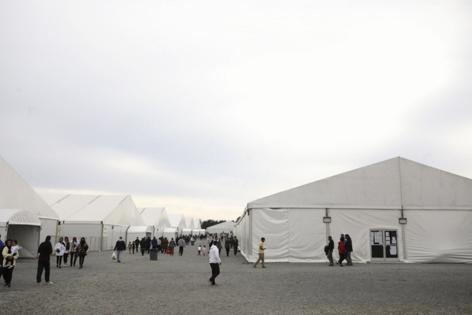Trump administration plans to hold immigration detainees on South Jersey military base
Published in News & Features
The Trump administration intends to house immigration detainees at a big South Jersey military base, naming it as one of two sites now certified to assist in the president’s plan for mass deportations.
Joint Base McGuire-Dix-Lakehurst, which spreads through Burlington and Ocean Counties, was approved to confine immigrants by U.S. Secretary of Defense Pete Hegseth, according to a July 15 letter he sent to U.S. Rep. Herb Conaway, D-N.J. The Democrat sits on the House Veterans’ Affairs Committee, and his district includes parts of the 42,000-acre facility.
It was not clear when the first immigrant detainees might arrive or how many might be held at the base.
Conaway, along with U.S. Sens. Cory Booker and Andy Kim and seven members of Congress, on Friday said they condemned the Trump administration’s decision “in the strongest possible terms.”
“This is an inappropriate use of our national defense system and military resources,” the elected Democrats said in a joint statement, one that escalates “a radical immigration policy that has resulted in the inhumane treatment of undocumented immigrants and unlawful deportation of U.S. citizens, including children, across the country.”
They called on Republican colleagues in New Jersey to help urge the administration to reverse the action, saying that “using our country’s military to detain and hold undocumented immigrants jeopardizes military preparedness and paves the way for ICE immigration raids in every New Jersey community. We have the greatest military in the world and using it as a domestic political tool is unacceptable and shameful.”
Efforts to reach Conaway were not immediately successful on Friday. The news about the base was first reported by NJ Spotlight News.
In his letter, Hegseth said that having the Department of Homeland Security house what he called “illegal aliens” will not hurt military training, operations, readiness or other military requirements, including National Guard and Reserve readiness.
The other military site named was Camp Atterbury in Indiana.
New Jersey already is home to two ICE detention facilities, Delaney Hall in Newark and the Elizabeth Detention Center in Elizabeth.
ACLU-NJ Executive Director Amol Sinha said Friday that expanding immigration detention onto military bases “sets a dangerous precedent and is contrary to the values embedded in our Constitution.”
“New Jersey already has the largest detention facility on the eastern seaboard, Delaney Hall, and with this expansion into Fort Dix, our state will continue to be the epicenter of President Trump’s mass deportation agenda.”
She called on U.S. senators and members of Congress to exercise their oversight authority, to ensure New Jersey is not “complicit in the Trump administration’s extreme agenda that continues to violate fundamental rights and undermine our democracy.”
Elected leaders on the Ocean County and Burlington County Boards of Commissioners could not be immediately reached for comment Friday. Pemberton Mayor Jack K. Tompkins, whose township abuts the military installation on the south, also could not be reached.
Joint Base McGuire-Dix-Lakehurst is the Defense Department’s only tri-service base, a hub with global reach, responsible for providing mission support, airlift, air refueling and combat airpower.
A spokesperson at the base referred questions on immigration detention to the Defense Department and to Immigration and Customs Enforcement.
The base was created by the 2009 combination of three installations: McGuire Air Force Base, once known as Rudd Field; the Army’s Fort Dix; and the Naval Air Engineering Station Lakehurst, perhaps best-known as the site of the Hindenburg disaster in 1937.
But the base has also served to house big, new populations — none of whom had been involuntarily forced onto a military base to await deportation. That would represent a dramatic change, from housing populations eager to start new lives in America, to confining those whom the government wants to kick out.
In 2021, amid the chaotic evacuation of Kabul as Afghanistan fell to the Taliban, the base was one of eight U.S. military installations to serve as “safe havens” for evacuated war allies and their families. The encampment known as “Liberty Village” was basically a small town on a military base, home to 3,377 families, three times the size of Cape May, New Jersey.
To house the Afghan allies, some of the base’s existing brick housing was supplemented by what were called tents, though those structures were hardened and more resilient than canvas.
A decade earlier in 2010, the base served as a relief center for evacuees who arrived after a devastating earthquake in Haiti. In 1999, then-Fort Dix provided temporary shelter to hundreds of Kosovo refugees amid the Kosovo War. And way back during the Cold War, from 1955 to 1957, Fort Dix housed Hungarian refugees fleeing Soviet repression.
Legally, the Department of Defense can make military bases available to any federal, state, or local law enforcement officials for law enforcement purposes, according to the National Immigration Law Center. For instance, in 2014, amid a crush of migrants from Central America, President Barack Obama housed thousands of children who were fleeing El Salvador, Guatemala, and Honduras on military bases in Texas, Oklahoma, and California.
_____
©2025 The Philadelphia Inquirer. Visit inquirer.com. Distributed by Tribune Content Agency, LLC.







Comments